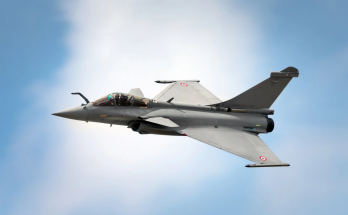Following two years under the Trump administration, it’s safe to say that relations between Washington and Europe are as raw and tense as at any time since the end of the Cold War.
At the three-day security equivalent of Davos – the annual Munich Security Conference on international security policy – the fractures between the two sides were on clear display.
European leaders, from German Chancellor Angela Merkel to European Union High Representative for Foreign Affairs and Security Policy Federica Mogherini, spoke, as did U.S. Vice President Mike Pence and former Vice President Joe Biden.
Merkel’s speech generated kudos and much applause, while Pence’s fell flat, serving only to bring into sharp relief the divisions between the two sides.
The whole affair generated much commentary from foreign policy think tank circles and ink from security-focused journalists, while laying bare the deep divide between a Europe deceiving itself over its place in a shifting global order and a Trump administration that repeatedly fails at diplomatic niceties, appreciation for allies, and consensus-building.
The downstream effects of the gathering U.S.-Europe divergence remain to be seen, but there is little doubt that frustrations are mounting on both sides of the Atlantic.
Yet, to view the splintering between Washington and Europe as a product of the current trans-Atlantic political environment is myopic – the schism has been building for years.
Whether from the loss of a unifying security threat in the Soviet Union, the U.S.-led invasion of Iraq in 2003, or the arrival of Donald Trump in the White House, the U.S. and Europe have been drifting apart in both security outlook and threat perception for some time.
One need only look back a few years to the previous administration of Barack Obama and his comment about “free riders” in Europe to know that all the reassuring words spoken by Joe Biden at Munich mattered little beyond temporarily smoothing over the concerns of EU officials and policy wonks.
To be fair, Europe has indeed made an effort to place more emphasis on defense investment since Russia’s takeover of the Crimean Peninsula from Ukraine in March 2014. But despite this much-heralded spike in collective European defense investment, significant improvement in operational output is not compiled in the short-term – it will take time and continued upward investment to rebuild and improve capabilities.
For now, there remains a question of how much surge capacity in terms of troops and equipment European nations are capable of mustering should a medium- or high-intensity conflict occur. The United Kingdom suffers shortages of vital skilled workers and fails to meet recruiting targets, as does Germany. The French military is stretched by missions at home and abroad that inhibit its ability to react to snap conflicts.
Questionable arguments aside about how much Europe spends on defending itself versus how much direct spending the U.S. places on European defense, the reality is that NATO partners in Eastern Europe – particularly the Baltic nations – rely on American security guarantees for their protection. Why they do so might be the real question policy analysts and government officials need to ask.
The only element of note from the revised European approach to defense spending – which still collectively remains below pre-global financial crisis levels – is a lingering dispute between NATO allies over how spending metrics should be counted.
Padding in military pensions, allocations to national police forces, foreign development budgets, and other sundry items would allow NATO partners to more easily reach the symbolic 2 percent of GDP investment threshold and provide refutation to Washington’s claim that European partners fail to pull their weight.
Such elements as cybersecurity development, intelligence-sharing, reconstruction aid, and peacekeeping deployments are, of course, vital to a comprehensive security approach.
But Europe continues to lean much more on its so-called soft power at the expense of focusing on its hard power, whether that hard power involves more troops, tanks, electronic warfare capabilities, hospital ships, or civil affairs officers.
"Investing in education or job creation might sometimes be more effective (for security) than having a tank in a battlefield," says EU high rep @FedericaMog at #MSC2019. "Military means are never sufficient alone." pic.twitter.com/ajOA9YGojq
— Teri Schultz (@terischultz) February 15, 2019
Besides Britain and France, most European NATO partners struggle to bring their armed forces into external operational theaters and sustain them once deployed. Europe continues to be divided on issues ranging from Syria to migrant inflows to Russia. Concern that China is using financial support for economically distressed nations as a means of strengthening its power and influence in Europe is thrown on the backburner as rage against the fulminations of Donald Trump and a drifting U.S. has become a conditioned reflex.
In the meantime, European leaders continue to fail to make the case to their citizens of the need for greater military readiness, and skeptical populations increasingly view the U.S. as a greater threat to their security than China or Russia.
By contrast, the U.S. is more concerned by the long-term strategic threats presented by China and Russia. The U.S. views the two countries’ aim is to undermine the international order and reshape it to their advantage. As security officials worry over erosion to the country’s longstanding military advantage and national military industrial base, the U.S. also confronts an arms race of a new kind in the area of fourth industrial revolution technologies.
As the “policeman of the global commons,” the U.S. grows weary of supporting European security, particularly when some Europeans see little need of partnering in that support. This seeming disregard for hard power to underwrite diplomacy rankles American policymakers and the American public alike.
So, too, does Germany’s embrace of Russian energy inflows with the Nord Stream II pipeline, diplomatic appearances at a ceremony honoring the Iranian Islamic Revolution, and consideration in letting Chinese tech giant Huawei Technologies participate in building the country’s high-speed Internet infrastructure despite concerns in Washington that it serves as a front for cyber-espionage operations (and Germany is not the only country in Europe to act in this way).
Matters have certainly not been helped by the U.S. president’s constant barrage of threats and insults leveled at Germany, Chancellor Merkel, the European Union, NATO, and whatever other obstacle he perceives challenging him.
President Macron of France has just suggested that Europe build its own military in order to protect itself from the U.S., China and Russia. Very insulting, but perhaps Europe should first pay its fair share of NATO, which the U.S. subsidizes greatly!
— Donald J. Trump (@realDonaldTrump) November 9, 2018
The transactional nature of the current occupant of the Oval Office is both new and repellent in European capitals, long used to being treated civilly and with at least a patina of respect by past administrations.
We have a MASSIVE trade deficit with Germany, plus they pay FAR LESS than they should on NATO & military. Very bad for U.S. This will change
— Donald J. Trump (@realDonaldTrump) May 30, 2017
But hoping that once Trump leaves office, things will go back to “normal” is not a forward-looking approach in an ever-changing global security environment.
American interests and European interests will not always align, and Washington recognizes far more than do Berlin or Brussels or Budapest the threat that China’s ongoing military buildup represents. Even where Russia is concerned, Europeans are split; in Germany’s case, it is willing to talk out of both sides of its mouth when it benefits Berlin (see: Nord Stream II).
The misplaced conceit among the foreign policy commentariat – that Angela Merkel represents the “leader of the free world” – was always an extreme case of wishful thinking, no more so than now as Germany fails to muster the slightest bit of military capability to underpin its foreign policy and the politically weakened chancellor heads for the exit in 2021.
No doubt Donald Trump’s departure from Washington will certainly ease U.S.-Europe relations, much as the exit from office of the previous European bogeyman, George W. Bush, did.
But as the intervening years showed, regardless of political party or White House occupant, American interests will remain in place.
Both the U.S. and Europe are unquestionably better off committed to working together through NATO, but the constant passing of Alliance summits and joint statements without concrete improvements on behalf of most members’ defense capabilities (currently only five meet symbolic spending metrics – one, of course, being the U.S.) does little to inspire confidence in Washington, let alone London.
Putting aside ideological rifts and focusing on such issues as an endgame in Afghanistan, counteracting China and Russia’s political warfare, and working more closely with like-minded nations farther afield from North America and Europe are key considerations in need of urgent attention.
Unfortunately, with European leaders clinging to bygone notions of trans-Atlantic understandings and Trump viewing things through a zero-sum lens, the short term offers little hope for greater amity.
European leaders hopeful that the worst will be over once Trump exits the stage might be wise to start realizing that the days of a U.S. willing to subsidize European security are past. Doing more for their own defense in real, tangible ways that buttress the NATO Alliance and provide for their own national defense might help their cause with a Washington whose gaze is increasingly directed east rather than west.
Dan Darling is Forecast International’s director of military and defense markets. In this role, Dan oversees a team of analysts tasked with covering everything from budgeting to weapons systems to defense electronics and military aerospace. Additionally, for over 17 years Dan has, at various times, authored the International Military Markets reports for Europe, Eurasia, the Middle East and the Asia-Pacific region.
Dan's work has been cited in Defense News, Real Clear Defense, Asian Military Review, Al Jazeera, and Financial Express, among others, and he has also contributed commentary to The Diplomat, The National Interest and World Politics Review. He has been quoted in Arabian Business, the Financial Times, Flight International, The New York Times, Bloomberg and National Defense Magazine.
In addition, Dan has made guest appearances on the online radio show Midrats and on The Media Line, as well as The Red Line Podcast, plus media appearances on France 24 and World Is One News (WION).




